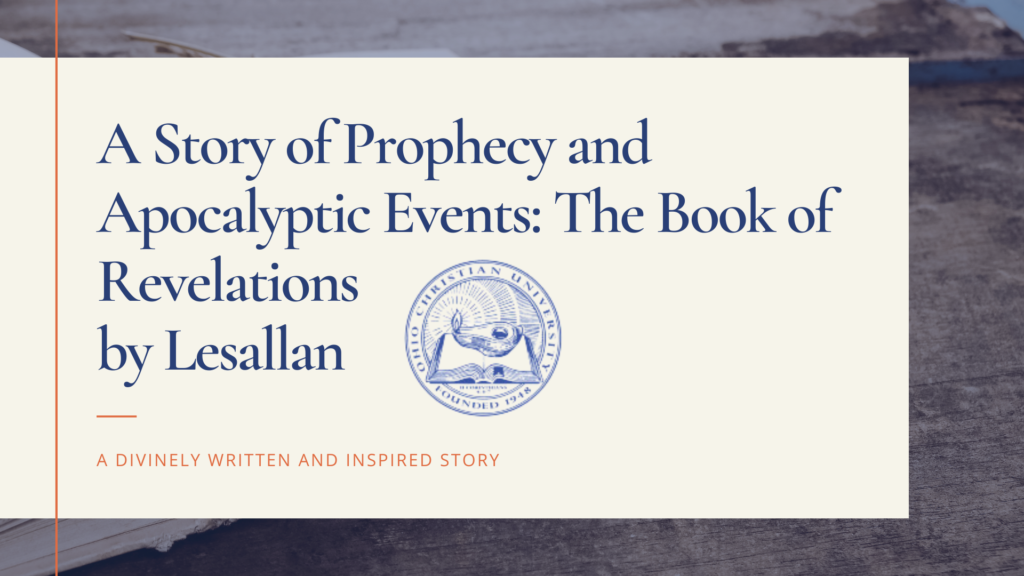Written by Lesallan Bostron
BIB3560 Revelation (ONLSP23)
Ohio Christian University
Pastor Alexander Soultz April 21, 2023


The Book of Revelation Survey Discussion
This student found many new insights that have been gained from the study and the Revelation Book Survey. This student found a new understanding in Revelation’s central message of revealing things yet to come and the destiny of God’s people and that of His enemies. New insights were gained into the overall construction of the Book of Revelation, the literary types (genres), symbols, and themes used by the apostle John when he wrote this book. The different perspectives (views) used for interpreting the Book of Revelation has also been studied, bringing additional insights forward. Revelation offers many challenges and questions not only to its readers, but to Biblical scholars as well. The biggest challenge found was how is the Book of Revelation relevant to life in this world today.
The Book of Revelation’s main message is to reveal future events and the final destiny of God’s people and that of His enemies.
Revelation is a call to repentance and a book of dire warnings of the disastrous consequences of refusing to live according to God’s ways. The book also affirms the sovereignty and majesty of God, the only One worthy of worship and praise. Revelation, in its message, celebrates the centrality and victory of Christ – the Lamb that was slain and the King of kings. It is the testimony of Jesus, through His Angel, and given to apostle John in a vision of the reality and severity of evil; that is, the evil that opposes God and His people. Revelation also offers hope and encouragement for the perseverance and faithfulness of the saints. These are those that have been overcome by the blood of the Lamb and the word of their testimony. Finally, this book also promises the glory of God’s kingdom, which will be wholly established when Jesus Christ returns.
The Book of Revelation’s general material includes various genres, symbols, and themes to convey the author’s message.
The Book of Revelation is first a book of prophecy given to Christians and those yet still to believe. The use of apocalyptic literature that uses various signs and symbols in Revelation reveals future events and the final destiny of God’s people and that of His enemies. Revelation contains many visions of John as well as the images, symbols, and Biblical Old Testament allusions. The pages of Revelation have six cycles of visions and use the number seven repeatedly. The final vision is of the new Jerusalem, paradise restored in the new heavens and earth. Overall, the Book of Revelation’s overarching message is to encourage all Christians to continue waiting and watching for the triumphal return of Lord Jesus Christ.
Three types of literary (structure) genres span throughout the Book of Revelation.
The Book of Revelation has a very complex and complicated literary structure. The literary structure spans three literary genres: the epistolary, the prophetic, and the apocalyptic. The epistolary nature of Revelation refers to the fact that it has been partially written as a letter to seven churches in the Roman province of Asia (modern-day Turkey). The letters to the churches begin with a greeting from the apostle John, who identifies as a servant of Jesus and a brother of the recipients (Revelation 1:4-6). Then written by John, are seven messages to the seven churches. Within these written letters, he addresses each of their specific situations. He also gives commendations, rebukes, exhortations, and promises through these letters (Revelation 2, 3). The letter ends with a benediction and a doxology (Revelation 22:20-21). Through its epistolary nature, the Book of Revelation was to be read and circulated through the churches. It had the pastoral purpose of instructing, encouraging, and providing warnings to Christians facing persecution and the temptations of the Roman Empire and its pagan culture. John creates a connection between himself and his readers by sharing his vision and suffering with them (Revelation 1:9-11). Apostle John, through the letters, invites the reader to participate in the Revelation through hearing, reading, keeping, and doing what has been written in it (Revelation 1:3; 22:7).
Through its prophetic nature, the Book of Revelation refers to the fact that it is a revelation from God—his Revelation about His actions and intentions for the present and the future. The Book of Revelation warns of the future events that will occur before Christ comes again (the second coming). This book (Revelation) also is the book which implies that it is not merely a historical record nor a spiritual allegory, but is a message still relevant and applicable to all generations of believers who face similar challenges and struggles. Because of its prophetic nature, the Book of Revelation also requires careful interpretation and discernment. Like any Book found in the Bible, there are many approaches (views) to understanding and then comprehending Revelation’s meaning and significance.
The apocalyptic nature of Revelation shows that it is part of a genre found in literature that reveals all of the divine mysteries and the future events that ultimately will affect the world and its inhabitants. Revelation uses visions, symbols, and allegories to show a transcendent, temporal, and spatial reality involving eschatological salvation and another supernatural world. The Book of Revelation draws on a tradition of Jewish and Christian writings from the Old Testament. These books were produced between 200 B.C. and 100 A.D. and include Books such as Daniel, 1 Enoch, and 4 Ezra. The Book of Revelation’s apocalyptic nature indicates that this book is not to be understood literally or historically, but symbolically and spiritually. Again, hope and comfort are found and offered in Revelation to those still afflicted and oppressed by the evil powers of this world. The pages of Revelation are the heaven’s eye view of events on earth, showing God’s sovereignty and judgment over His enemies. Also shown through careful reading of its pages are God’s grace and mercy towards His people. As readers, we are challenged to comprehend the meaning and significance of its images and messages, even though they are not always clear or explicit.
Scholars assign four primary schools of interpretation regarding the Book of Revelation.
Interpreting Revelation from the perspective or view of the historicist has this book as a prophetic overview of the history from the first century until the second coming of Christ. Interpretation from the preterist treats the visions as having dealt with past events alone – specifically the events which occurred during apostle John’s time of being alive here on earth. The view from futurists (futurism) sees the visions, the exceptions being in Revelation chapters one through three, as related to end-time events yet to be in the future. Finally, the idealist view Revelation as a symbolic representation of the ongoing spiritual warfare between good and evil, God and Satan. Another view or approach of interpretation is that of eclecticism. This approach is conceptual and does not hold to a single paradigm or a set of assumptions. Instead, the eclectic approach draws upon multiple theories, styles, and ideas to gain a complimentary insight into a subject or to apply a different view in particular cases.
The Book of Revelation raises many challenges and questions; the most important for believers is applying this book to life.
There are many ways that the Book of Revelation can be applied to and made applicable to life in this world today. Worship of God and the Lamb – Revelation gives us a picture of the majesty and worthiness of God in Christ, those who are praised and adored by the heavenly beings and the redeemed saints. Believers can join them by acknowledging God’s sovereignty, holiness, justice, and grace, and live, by giving thanks to Jesus Christ for His sacrifice, resurrection, rising, and Lordship. God and the Lamb can also be worshipped by living in obedience to their will and bearing witness to their gospel. Oppose the beast and his image, and never compromise with the world and its idolatrous systems – systems inspired by Satan and his minions. Opposition and resistance can be found by refusing to conform to this world, “And be not conformed to this world: but be ye transformed by the renewing of your mind, that ye may prove what is that good, and acceptable, and perfect, will of God” (Romans 12:2, KJV). Great care and caution must be undertaken when exposing the beast and the image of the beast, the lies and deception of the beast in this world today. The best thing is to leave the beast alone and know that God will judge all in the end. During periods of suffering and persecution, Revelation encourages us to remain faithful and hopeful so that we may face our allegiance to Jesus Christ. We can endure anything by remembering that God is with us and for us; He will not let us be tempted beyond that which is bearable and will reward us for persevering and always pray for God’s strength, grace, and protection. Anticipation of Christ’s return and the new creation and the invitation that the Book of Revelation gives us is to look forward to the glorious day when He returns to judge the living and the dead, to destroy all evil, and to establish His Eternal Kingdom.
References:
Book of Revelation – ESV – Bible Study Tools. (n.d.-b). Biblestudytools.com. https://www.biblestudytools.com/esv/revelation/
Grey, E. (2014, July 4). Erika Grey. Prophecy Talk. https://erikagrey.com/short-summary-of-the-book-of-revelation/
Insight for Living Ministries. (2009, June 4). Reading Revelation. Www.insight.org. https://www.insight.org/resources/article-library/individual/reading-revelation
Koester, C. R., & Coffman, K. P. (2023, January). Summary of Revelation. Enter the Bible. https://enterthebible.org/courses/revelation/lessons/summary-of-revelation
LaHaye, T. (2010). Revelation Unveiled. Zondervan.
Pena, A. (2018, April 18). 5 important things to know about the Book of Revelation. Www.christiantoday.com. https://www.christiantoday.com/article/5-important-things-to-know-about-the-book-of-revelation/128526.htm
REVELATION KJV. (1611). Www.kingjamesbibleonline.org. https://www.kingjamesbibleonline.org/Revelation
Smith, J. (2019). Revelation Summary. Biblehub.com. https://biblehub.com/summary/revelation/1.htm
The Book of Revelation. (n.d.). Www.cliffsnotes.com. https://www.cliffsnotes.com/literature/n/new-testament-of-the-bible/summary-and-analysis/the-book-of-revelation
TheLastDialogue. (2019, February 24). Book of Revelation Summary. The Last Dialogue. https://www.thelastdialogue.org/book-of-revelation-summary/


